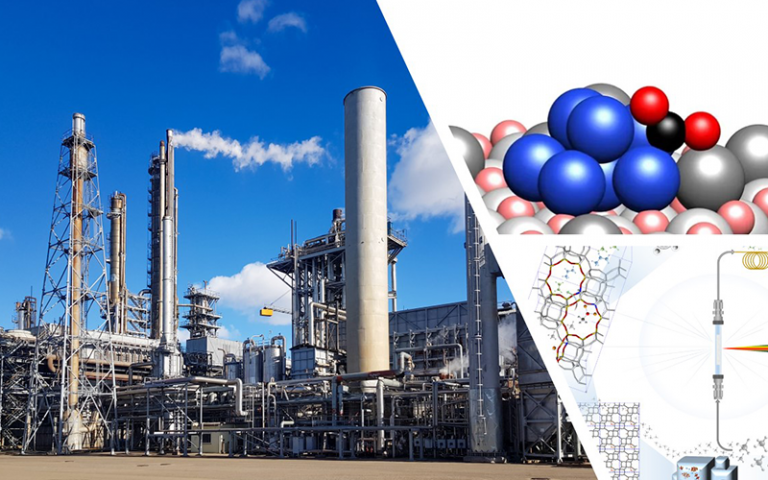Improving the performance of industrial catalytic systems with computational methods
New experimental and computational approaches to design and analysis have improved the performance and efficiency of industrial catalysts in energy, environment, bulk, and fine chemicals production.

12 April 2022
Catalysis is hugely important to the British and global economy (worth £50 billion and £1.5 trillion per annum respectively), where 80% of every man-made industrial chemical/product has encountered a heterogeneous catalyst in its lifetime.
Any improvement in catalyst performance leads to direct economic and environmental benefits, by reducing unwanted products or lowering energy costs. These efficiency savings are particularly important in the production of chemicals, and in energy generation and storage.
Research led by Professors Andrew Beale, Gopinathan Sankar and Richard Catlow (all UCL Chemistry) into the development of novel analytical techniques, methods, data handling and analysis procedures, tracked the behaviour of catalytic materials often studied under real reaction conditions.
The team obtained the data largely by using Laser, X-ray, and Neutron based techniques at the Harwell Science and Innovation Campus to characterise the composition of a series of heterogeneous materials (supported metals on powders to structured catalysts) in real-time during a catalytic reaction. The insights obtained are unique, as they are obtained from UCL-specific capability involving advanced characterisation methodology, often combined with the novel computational methods.
Machine-learning breakthroughs
This real-time characterisation was regularly exploited by the UCL spin-out Finden, which was founded in 2012 by Professor Beale to commercialise this greater understanding of catalyst properties and behaviour.
Finden used machine-learning methods to take advantage of the large volume of data from X-ray diffraction experiments, to achieve a more holistic (spatial) characterisation of the evolving catalyst composition during reaction than more standard single-point measurements.
Collaboration between UCL and Johnson Matthey (JM) allowed JM to prepare new products across strategic areas such as novel fuel cell formulations, sustainable hydrogen, and clean air applications, with improved performance that complies with current and future legislation.
For example, the quantum mechanics/molecular mechanics modelling known as ChemShell has allowed JM to model zeolites used in the selective catalytic reduction (SCR) reactions to safely turn the NOx found in combustion engine emissions, into N2 and H2O. This allows for the manufacture of higher temperature operation products, which provides improved insight and activity that enables JM to obtain its position as a market leader.
Collaborating for success
Knowledge-transfer activities enabled by the UCL team’s work have resulted in UCL-trained scientists being employed by a number of industry partners including JM and Finden, with six FTE employees respectively. Their knowledge of catalyst characterisation serves as a critical component of the success of the operation.
At Finden, X-ray tomography expertise from UCL alumni has enabled the expansion of the spinout to offer a wider variety of services, driving exponential growth in sales – totalling more than £1.5 million since 2014.
Knowledge transfer between UCL and JM initiated the creation of the JM Research Centre in South Africa and the Electron Physical Science Imaging Centre at the Diamond Light Source (Harwell Campus). The introduction of synchrotron radiation techniques at JM has been invaluable to the company’s catalytic technology and materials processing.
Research synopsis
Application of experimental and computational methods for improved performance of industrial catalytic systems and processes
New experimental and computational approaches to design and analysis have improved the performance and efficiency of industrial catalysts in energy, environment, bulk, and fine chemicals production. This then resulted in the creation of the successful start-up company Finden Ltd.
Links
- Professor Andrew Beale’s academic profile
- Professor Gopinathan Sankar’s academic profile
- Professor Richard Catlow’s academic profile
- Department of Chemistry
- UCL Faculty of Maths & Physical Sciences
- UCL Faculty of Maths & Physical Sciences REF 21
Image
- Image credit: Beale and Catlow
 Close
Close

